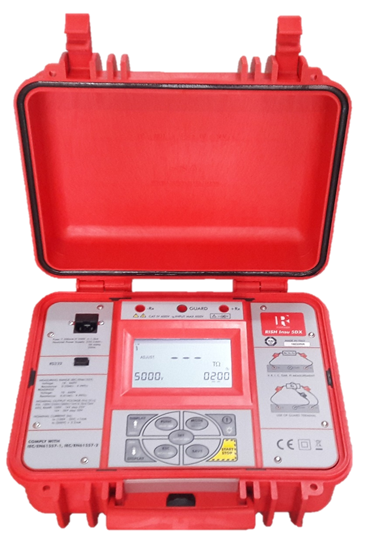
Overview
Insulators are used in electrical equipment to support and separate electrical conductors without allowing current through themselves. Therefore, an insulating material is used to wrap or coat conductors. Due to ageing, impact of moisture, chemicals or high voltage, insulation is subjected to breakdown. Insulation Resistance testing is used as a quality control measure at the time of manufacturing, as an installation requirement to help ensure specifications are met, used as a periodic preventive maintenance task and as a troubleshooting tool.
Importance of Insulation Resistance Testing
It is very important to make sure that the insulation resistance of an electrical equipment is within limits. In process industry like Iron and Steel plant, the internal environment is very extreme. The heat sizzles inside the steel plant due to acute temperature levels of rolling mills which operate at temperatures as high as 900°C, as well as presence of acidic fumes makes the environment more critical for both workers and machines to work efficiently.
Embedded power generation or captive power plants are crucial in process industries to ensure continuous and qualitative power supply. The power requirement of such plants is as much as 700-800 MW and constitute elements like transformers, switchgears, converters & cables in its substation. Inside a steel plant, number of electric motors are installed as electrical drives required for manufacturing processes. All of these constitute as an integral part of the manufacturing plant. Thus, it is imperative to execute tests and maintenance activities on a periodic basis.
- Transformers : Testing on a transformer is important to confirm its ability to continue functioning properly and to reduce the chances of failure. The tests carried out are Insulation Resistance tests i.e. spot test using DC voltage and Diagnostic tests.
- Electric motors : The motor windings are subjected to acidic and hot fumes present in the atmosphere, therefore the strength of the insulation of motor windings should be tested by Insulation Resistance testing.
- Cables : Insulation resistance testing is a key test for electrical cables as it is a measure of how effectively the cable is insulated. Poor insulation may result in short circuit, electric shock or fire.
Applications
- Distribution Network Department (DNW) : The DNW department is involved in the testing and maintenance of plant’s distribution networks equipment. Transformers rated 83 MVA & 63 MVA present in the 132 kV and 220kV substations undergo Insulation Resistance test. This test is carried out on the transformer winding as a preventive maintenance activity and for fault analysis. Also the Insulation resistance of Duct cables and isolators in the switchyard is tested using Rish Insu 5Dx.
- Electrical Repair Shop : Electrical motors and other such equipment are repaired in this shop. One of the most basic tests carried out to understand the causes of motor failure is the Insulation Resistance testing of motor windings. Motors which are rewound also undergo IR testing. Rish Insu 5Dx is hence used to test 5 MW and 10 MW HV motors. Rewound motors are tested using Ramp Test. To get better insights, Polarization Index (PI) and Dielectric Absorption Test (DAR) are also carried out.
- Electrical Testing Lab : Newly purchased equipment like electric motors, transformers, cables and other accessories are tested before installation. The tests are conducted as per standards. Failure of any equipment in this process is returned or rejected.
Benefits
- Adjustable mode helps to select various DC voltages ranging from 100V to 5kV
- Results stored in the internal memory can be retrieved to obtain test results
- Overlooked problems can be revealed using the Ramp test method with selectable test voltage and time duration
- Multiple options to power up device
Features
- Measurement range up to 10 Tohm
- FIX mode with test voltage of 100V, 250V, 500V, 1kV, 2.5kV & 5kV DC
- Short circuit current 3mA
- ADJUSTmode with test voltage selectable from 100 to 5k VDC
- RAMP mode with selectable duration time and test voltage
- Polarization Index (P.I.) & Dielectric Absorption Ratio (D.A.R) measurement
- DC/AC TRMS voltage up to 600V
- GUARD test lead for surface leakage current compensation
- MAX, MIN limit selectable threshold on measurements
- Automatic discharging of device under test
- Fuse protection on power supply
- RS-232 interface for PC connection

